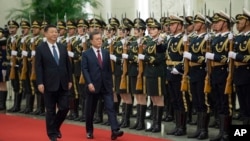South Korean President Moon Jae-in met his Chinese counterpart Xi Jinping on Thursday during a visit to Beijing aimed at repairing ties frayed by a dispute over the deployment of an American anti-missile system.
The two leaders were to preside over a document signing ceremony following their talks, although there was no indication they would be issuing statements. While the visit is a sign of progress toward resolving the more than one-year-old dispute, China continues to demand the removal of the U.S. Terminal High-Altitude Area Defense system, known as THAAD, saying it allows South Korea and its U.S. ally to spy on military activity in northeastern China.
South Korean businesses in China have suffered as a result of the dispute. China suspended group tours to South Korea that are a mainstay of the local tourism industry, pulled South Korean soap operas off television and banned the country's popular K-Pop stars from visiting.
South Korea's Lotte business group, which provided the land for the missile-defense system, had to suspend business amid the anti-South Korea sentiments.
Moon has strived to balance South Korea's close political and military ties with the U.S. with its economic dependency on the Chinese market. While South Korea has resisted China's demands to withdraw THAAD, which it says is needed to counter the threat of North Korean missiles, Beijing has said it approves of a pledge from Seoul not to expand it.
That set the stage for a visit by South Korean Foreign Minister Kang Kyung-wha to Beijing last month at which she and Chinese Foreign Minister Wang Yi affirmed their commitment to repair relations.
But Thursday's visit was marred before the leaders met by reports that South Korean journalists following the president had been beaten by Chinese security agents in a scuffle that required intervention from South Korean presidential staff and emergency treatment for two journalists.
Seoul "regretted" that South Korean reporters were injured, said Foreign Ministry spokesman Noh Kyu-duk, who issued a strong request to Beijing to investigate the case and respond with "needed measures."
North Korea is also a focus of the talks. China is North Korea's most important political and economic partner, but has enforced increasingly strict United Nations sanctions against its neighbor while seeking to persuade all parties to return to denuclearization talks.
A visit to Pyongyang, North Korea's capital, by Chinese special envoy Song Tao last month appears to have created no breakthroughs. Song visited as part of a tradition of exchanges between the ruling parties of the two countries, but left apparently without meeting North Korean leader Kim Jong Un.
South Korean President Moon in China on Visit to Repair Ties

BEIJING —



